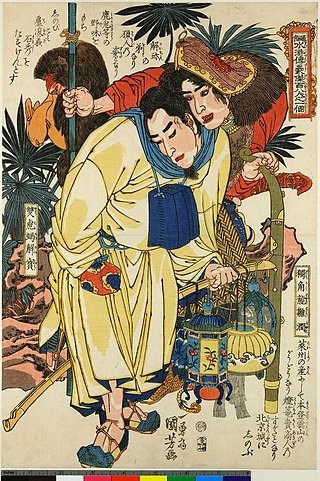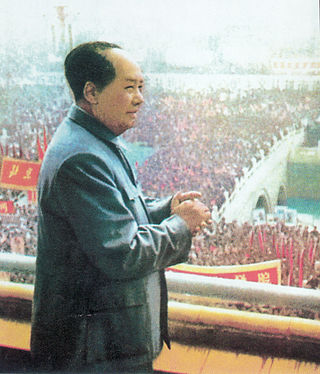Related Research Articles

Mao Zedong, also known as Chairman Mao, was a Chinese politician, political theorist, military strategist, poet, and revolutionary who was the founder of the People's Republic of China (PRC). He led the country from its establishment in 1949 until his death in 1976, while also serving as the chairman of the Chinese Communist Party (CCP) during that time. His theories are known as Maoism.

The Long March was a military retreat by the Chinese Red Army from advancing Nationalist forces during the Chinese Civil War in 1934 through to 1936.
A cult of personality, or a cult of the leader, is the result of an effort which is made to create an idealized and heroic image of a glorious leader, often through unquestioning flattery and praise. Historically, it has developed through techniques of mass media, propaganda, spectacle, the arts, patriotism, and government-organized demonstrations and rallies. A cult of personality is similar to apotheosis, except that it is established by modern social engineering techniques, usually by the state or the party in one-party states and dominant-party states. Cults of personality often accompany the leaders of totalitarian or authoritarian governments. They can also be seen in some monarchies, theocracies, failed democracies, and even in liberal democracies.

The modern Chinese tunic suit is a style of male attire originally known in China as the Zhongshan suit after the republican leader Sun Yat-sen. Sun Yat-sen introduced the style shortly after the founding of the Republic of China (1912–1949) as a form of national dress with distinct political overtones. The four pockets are said to represent the Four Virtues of propriety, justice, honesty, and shame; and the five buttons the branches of China's former government.

Qin Bangxian better known by his alias Bo Gu, 14 May 1907 – 8 April 1946) was a Chinese senior leader of the Chinese Communist Party and a member of the 28 Bolsheviks.

Xie Zhen is a fictional character in Water Margin, one of the Four Great Classical Novels in Chinese literature. Nicknamed "Double-headed Serpent", he ranks 34th among the 36 Heavenly Spirits, the first third of the 108 Stars of Destiny.

Xie Bao is a fictional character in Water Margin, one of the Four Great Classical Novels in Chinese literature. Nicknamed "Twin-tailed Scorpion", he ranks 35th among the 36 Heavenly Spirits, the first third of the 108 Stars of Destiny.

Sun Li is a fictional character in Water Margin, one of the four great classical novels of Chinese literature. Nicknamed "Superior to Yuchi", he ranks 39th among the 108 Stars of Destiny and third among the 72 Earthly Fiends.
Yue He is a fictional character in Water Margin, one of the Four Great Classical Novels in Chinese literature. Nicknamed "Iron Whistle", he ranks 77th among the 108 Stars of Destiny and 41st among the 72 Earthly Fiends.
Gu Dasao is a fictional character in Water Margin, one of the Four Great Classical Novels of Chinese literature. Nicknamed "Female Tiger", she ranks 101st among the 108 Stars of Destiny and 65th among the 72 Earthly Fiends.
Sun Xin is a fictional character in Water Margin, one of the Four Great Classical Novels in Chinese literature. Nicknamed "Little Yuchi", he ranks 100th among the 108 Stars of Destiny and 64th among the 72 Earthly Fiends.

Zou Yuan is a fictional character in Water Margin, one of the Four Great Classical Novels in Chinese literature. Nicknamed "Forest Emerging Dragon", he ranks 90th among the 108 Stars of Destiny and 54th among the 72 Earthly Fiends.

Zou Run is a fictional character in Water Margin, one of the Four Great Classical Novels of Chinese literature. Nicknamed "Single Horned Dragon", he ranks 91st among the 108 Stars of Destiny and 55th among the 72 Earthly Fiends.

Gu is a Chinese family name. Some places such as South Korea, and early immigrants from Wu-speaking region in China usually romanize this family name as Koo or Ku. It is the 93rd name on the Hundred Family Surnames poem.
The Hundred Flowers Award for Best Actor was first awarded by the China Film Association in 1962.

Liu Shaoqi was a Chinese revolutionary and politician. He was the chairman of the Standing Committee of the National People's Congress from 1954 to 1959, first-ranking vice chairman of the Chinese Communist Party from 1956 to 1966, and the chairman of the People's Republic of China, the head of state from 1959 to 1968. He was considered to be a possible successor to Mao Zedong, but was purged during the Cultural Revolution.
Fight for Nanjing, Shanghai and Hangzhou, also known as Great Battle in Ning Hu Hang, is a 1999 Chinese epic war film directed by He Xiaojiang and Shi Wei and written by Lu Zhuguo, and starring Gu Yue, Sun Feihu, Liu Xitian, Xie Weicai, Sun Weimin, and Lu Qi. The film premiered in China in 1999. The film is about the war between the Chinese Communist Party troops and the Kuomintang troops in east China during the Chinese Civil War.
Birthday Celebration by Five Daughters (五女拜壽) is a Chinese Yue opera play written by Gu Xidong (顾锡东) in 1982, set in the Ming dynasty before and after the fall of Yan Song. There is some similarity between the story and that of King Lear, although Gu Xidong never acknowledged any Shakespearean influence. The story emphasizes the importance of traditional Confucian values such as filial piety, which like traditional theatre had been attacked and suppressed during the Cultural Revolution (1966–1976).

Mao Zedong's cult of personality was a prominent part of Chairman Mao Zedong's rule over the People's Republic of China from the state's founding in 1949 until his death in 1976. Mass media, propaganda and a series of other techniques were used by the state to elevate Mao Zedong's status to that of an infallible heroic leader, who could stand up against the West, and guide China to become a beacon of communism.

A cult of personality has been developing around Xi Jinping since he became General Secretary of the ruling Chinese Communist Party and the country's paramount leader in 2012.
References
- ↑ "Gu Yue, 68; Actor Portrayed Mao in 84 Films, TV Shows". Los Angeles Times . 2005-07-06. Retrieved 2024-09-25.
- ↑ Barme, Geremie (2016-09-16). Shades of Mao: The Posthumous Cult of the Great Leader: The Posthumous Cult of the Great Leader. Taylor & Francis. p. 177. ISBN 978-1-315-28576-4.